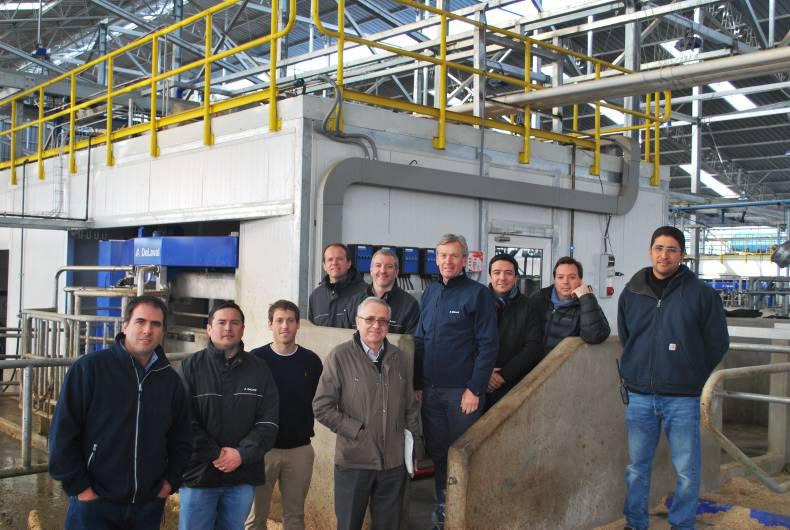A large dairy farm in Chile with 6,500 dairy cows in total, has signed an agreement with DeLaval, which will see the farm install an extra 48 VMS milking robots.
This will bring the total number on the farm to 64, making it the world’s largest robotic milking farm.
The 64 VMS units will milk 4,500 cows.
Benefits
The farm, owned by Ancali Agrícola already has 16 DeLaval VMS installed, with an average yield of 45.2 litres for the 920 cows going through the robotic milking system per day, making a 10% increase in milk production.
Pedro Heller, CEO at Ancali Agrícola, said: “The benefits have been remarkable – more production, better animal welfare conditions and less stress for the cows.’’
Two stages to the project
“This project included two stages,” he explained.
“Firstly, we compared the benefits of using DeLaval VMS systems versus rotary milking systems. We started using robots for 500 cows, and when we saw the economic benefits and we realised that it was possible to improve production per cow by 10% and reduce the stress of the cow, we decided to further explore.
“During the second stage, we decided to modify the farm, changing our conventional milking system for an automatic milking system. The plan is to have our best 4500 cows milked by DeLaval VMS and we believe we have a perfect set-up should we decide to grow more in the future.”
Read more
Savings advice for farmers at Teagasc dairy farm walks
Creed hosts his first meeting of dairy forum
A large dairy farm in Chile with 6,500 dairy cows in total, has signed an agreement with DeLaval, which will see the farm install an extra 48 VMS milking robots.
This will bring the total number on the farm to 64, making it the world’s largest robotic milking farm.
The 64 VMS units will milk 4,500 cows.
Benefits
The farm, owned by Ancali Agrícola already has 16 DeLaval VMS installed, with an average yield of 45.2 litres for the 920 cows going through the robotic milking system per day, making a 10% increase in milk production.
Pedro Heller, CEO at Ancali Agrícola, said: “The benefits have been remarkable – more production, better animal welfare conditions and less stress for the cows.’’
Two stages to the project
“This project included two stages,” he explained.
“Firstly, we compared the benefits of using DeLaval VMS systems versus rotary milking systems. We started using robots for 500 cows, and when we saw the economic benefits and we realised that it was possible to improve production per cow by 10% and reduce the stress of the cow, we decided to further explore.
“During the second stage, we decided to modify the farm, changing our conventional milking system for an automatic milking system. The plan is to have our best 4500 cows milked by DeLaval VMS and we believe we have a perfect set-up should we decide to grow more in the future.”
Read more
Savings advice for farmers at Teagasc dairy farm walks
Creed hosts his first meeting of dairy forum







 This is a subscriber-only article
This is a subscriber-only article










SHARING OPTIONS: